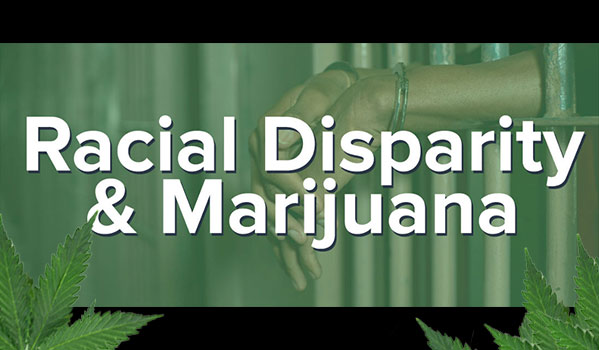Racial Disparity & Marijuana
Sadly, the War on Drugs in the United States has produced severely unequal outcomes among racial groups, with the bulk of marijuana related arrests being driven by racial discrimination from law enforcement and it’s guiding bureaucratic agenda.
The American Civil Liberties Union pointed this out in June 2013 when The War On Marijuana in Black and White: Billions of Dollars Wasted on Racially Biased Arrests was published. This report analyzes the number of marijuana arrests per state, by race, from 2001 to 2010. It also takes a look at how much money is wasted enforcing marijuana prohibition laws in each state and across the nation.
Marijuana use reported by whites and blacks has been nearly equal from 2001 to 2010 with white people between the ages of 18 and 25 reporting more usage than black people of the same age range. If marijuana is used equally between both races, how is it possible that black people are 3.7 times more likely to be arrested on marijuana charges?
The info-graphic below expresses many other facts pointed out by the ACLU report, including which four counties in the United States rank highest for racially biased arrests.

This figure, 3.7, is an average number representing all fifty states. This means that some states have a shockingly higher rate of difference. For example, in the state of Iowa, a black person is 8.3 times more likely to be arrested for marijuana than a white person. Minnesota and Illinois follow closely behind with 7.8 and 7.6. Whereas, New Mexico and Maine are on the much lower end with 1.9 and 2.1. Hawaii is the only state that shows zero racial disparity for marijuana arrests, but black people only make up 2.3% of the population.
Law enforcement agencies operate under policies that praise officers for the quantity of arrests, rather than the quality. The number of people arrested for marijuana in 2010 surpassed the total number of people arrested for ALL violent crimes combined. Marijuana charges now account for half of all total drug arrests, and 88% of those are for just possessing marijuana. It is much easier for officers to target people on the streets in minority communities, and be viewed as successful, than it is to work long hours investigating a violent crime.
In 2010, the United States as a whole spent over $3 billion to enforce marijuana laws. This means that the U.S. has wasted an obscene amount of money ruining the lives of many, over a plant that is now legal for retail sales in two states. The Director of the ACLU Criminal Law Reform Project, Ezekiel Edwards, described this tragedy best, in a 2013 press release,
“The aggressive policing of marijuana is time-consuming, costly, racially biased, and doesn’t work. These arrests have a significant detrimental impact on people’s lives, as well as on the communities in which they live. When people are arrested for possessing even tiny amounts of marijuana, they can be disqualified from public housing or student financial aid, lose or find it more difficult to obtain employment, lose custody of their child, or be deported.”
The ACLU and many people of the United States are calling for marijuana to be legalized, regulated and taxed, or at the very least decriminalized.
Legalization and taxation would solve the problems of unjust, racially biased arrests as well as wasting tax payer dollars. In recent months, the District of Columbia and Philadelphia have realized this, and decriminalized marijuana possession as a result. In states that will not alter marijuana laws, the ACLU suggests that law enforcement agencies move marijuana possession arrests to the bottom of the list of priorities, and focus on real crimes instead.
The November 2014 election will be a look into the future of marijuana policy reform in the United States, with voters in both Oregon and Alaska having the opportunity to stand up against these racially biased arrests by ending the war on marijuana in those states. The decision of voters in these two states next month, will set a precedence for the remaining states to join the movement in the 2016 primary election.
Source: https://www.whaxy.com/news/racial-disparity-marijuana-arrest



